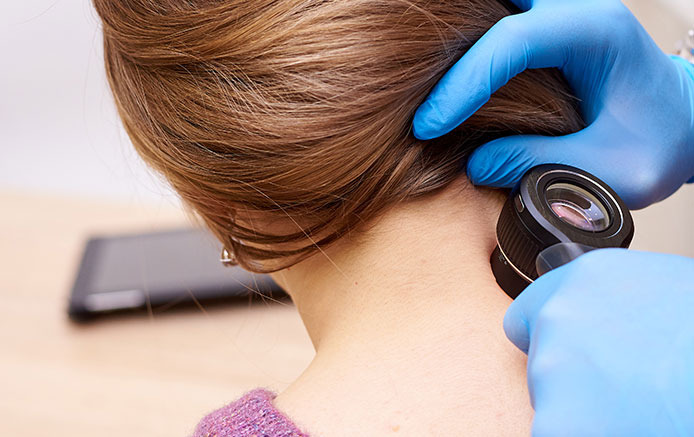
SERVICES
Cancer Screening
What is skin cancer?
Skin cancer is an abnormal growth of skin cells that generally occurs in areas of the body exposed to the sun and can also occur in areas that do not usually get sun exposure. There are different types of skin cancers, namely:
- Basal cell carcinoma
This is the most common skin cancer that begins in the basal cells. Basal cells are cells that line the epidermis and are responsible for replacing old cells with new ones. Basal cell carcinoma results in the appearance of tumours on the surface of the skin. These tumours typically look like bumps, growths, sores, scars or red patches. - Melanoma
This is a less common but most dangerous type of skin cancer that occurs in the melanocytes, cells that produce the pigment that gives the skin its colour, called melanin. Exposure to ultraviolet radiation from sunlight or tanning lamps and beds may increase the risk of developing melanoma. - Squamous cell carcinoma
This is a type of skin cancer that begins in the squamous cells. Squamous cells are thin flat cells that make up the outermost layer of the skin called the epidermis. It results in red, scaly patches, open sores, or warts on the skin. These abnormal cell growths may occur anywhere but commonly occur in areas of the skin that are mostly exposed to ultraviolet (UV) radiation, either from sunlight or tanning beds or lamps. - Actinic keratosis
Also known as solar keratosis, actinic keratosis is a type of skin cancer that occurs in areas that have been damaged by long-term exposure to the sun. Actinic keratosis occurs when skin cells called keratinocytes begin to grow abnormally, forming scaly discoloured spots. Solar keratosis may occur on the hands, face, neck, scalp, or arms.
Cancer screening is a visual examination of the skin to check the skin for moles, birthmarks and other marks that do not look normal. Dr Zinzi Limba is specially trained in detecting skin cancers.
What does cancer screening entail?
During an appointment with Dr Limba, she will perform a thorough examination of your skin, from the scalp to the bottoms of your feet. She will look for suspicious spots that may be cancerous. Should the dermatologist find a spot that might be pre-cancerous or cancerous, she will take a picture for your medical chart and perform a skin biopsy. The biopsy involves Dr Limba removing a small amount of tissue to be examined under a microscope. If the spot is cancerous, it will be removed entirely or treated.
Cancer Screening FAQ:
Are there any risks to the screening?
No, there are no risks to having a skin cancer screening.
How often should I go for a skin cancer screening?
It is recommended that one does a skin cancer screening once a year.
Why is a skin cancer screening needed?
Skin cancer screening is needed, especially if you have certain risk factors such as:
- Light skin tone
- Light coloured eyes
- Skin that burns and/or freckles easily
- History of sunburns
- Frequent exposure to the sun
- A large number of moles
- Family and/or personal history of skin cancer
- Blonde or red hair

